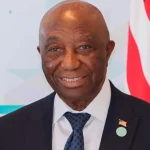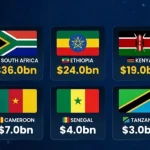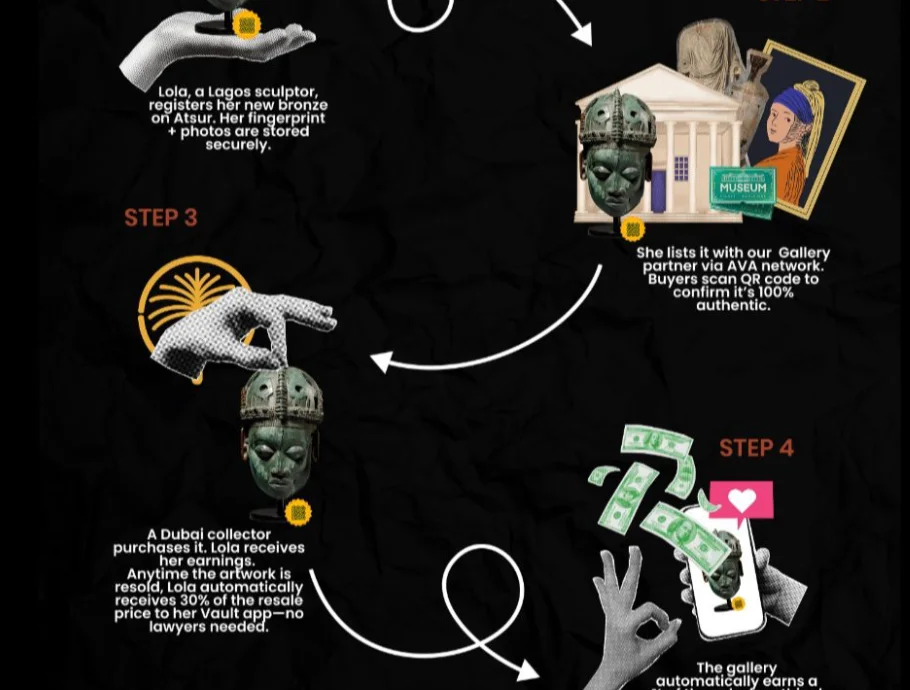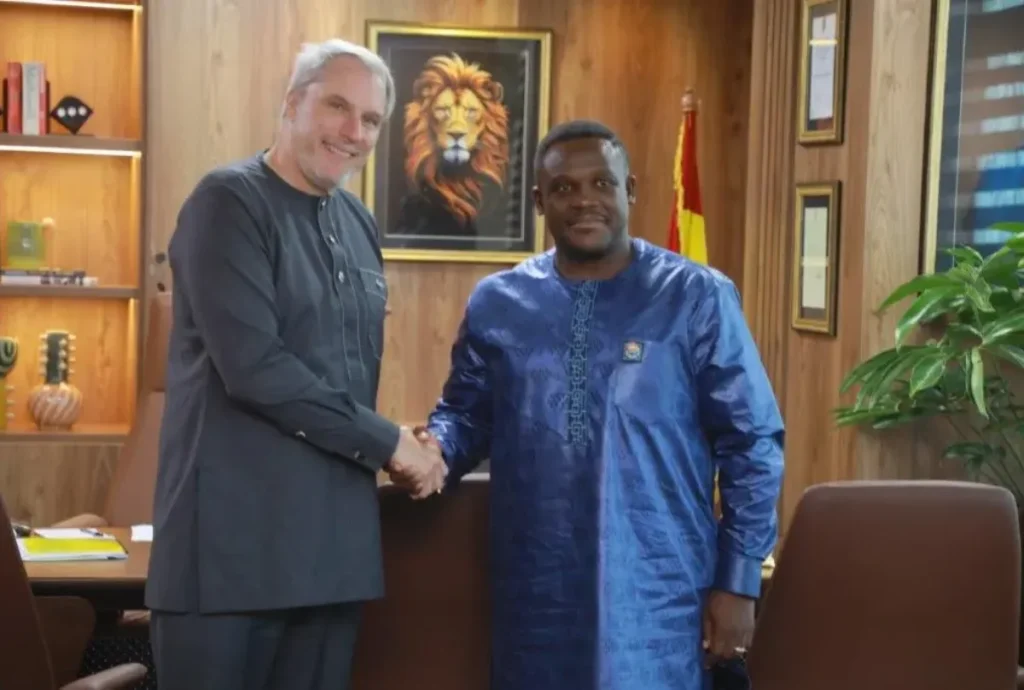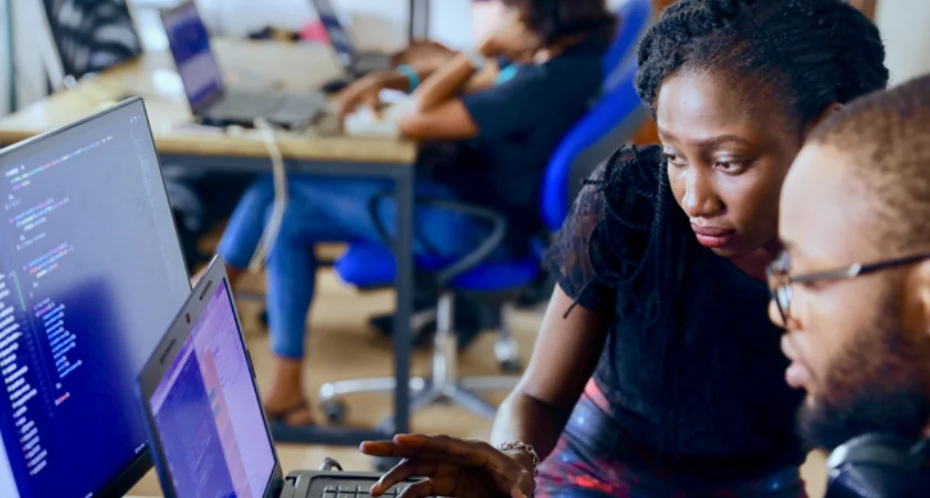For Adaobi Orajiaku, art and blockchain are not just passions; they are personal missions. As the founder and CEO of AtSur Technologies LTD, a Nigerian-based rising ArtTech startup, she is blending new technology with a deep love for African heritage to address one of the most pressing issues in the art world: authenticity and provenance.
With a mission to use blockchain to verify, protect, and elevate the authenticity of African artworks, her mission is deceptively simple, but its impact is anything but modest.
“I am a humble art collector and a lifelong technologist,” she tells me with a knowing smile, recalling her earliest interactions with African art. “I saw a gap in how African art was being valued and authenticated, and I knew blockchain could fill it,” she explains.
A seasoned software engineer with over 13 years of experience, Adaobi Orajiaku has worn many hats, including robotics, full-stack development, and blockchain engineering. However, it was not until the 2020 lockdown that she dove into blockchain, first through experimental projects and then through real-world consulting.
“I was involved in building blockchain applications way before NFTs became the buzzword,” she tells me. “We predicted the NFT bubble before it even happened. But instead of chasing hype, I wanted real impact.”
“During the lockdown in 2020, I was already experimenting with blockchain in fintech and identity systems. But as I started speaking to artists and curators, I realised something major was missing in the African art ecosystem: trust.”
Unlike Western institutions, where Sotheby’s or Christie’s validate art pieces, African art lacks formal documentation, making provenance murky and resale value difficult to establish. Adaobi’s response was AtSur, a digital platform designed to institutionalise credibility around African art.
How AtSur works
Think of AtSur as the digital notary, a blockchain-powered registry and certification system for African art.
Here is how it works: artists or collectors upload a digital version of their artwork. AtSur’s team verifies and authenticates the piece, cross-checks the ownership history, and registers its metadata on a tamper-proof blockchain ledger.
“We verify artworks like a bank verifies KYC. We ensure provenance before we issue a blockchain-backed certificate of authenticity. Every time that piece is sold, transferred, or exhibited, the record is automatically updated, creating a verifiable timeline of ownership,” she explains.
In addition, every sale, transfer, or resale is recorded, building a lifelong ownership history that adds real value to the work.
It also enforces smart-contract-enabled royalties for artists every time their work changes hands, something rare in Africa’s informal art economy. This has the potential to transform Africa’s informal art market by ensuring creators are not left out of future financial gains.
“We are building a financial ecosystem around African art, where artists and collectors both benefit from transparency and longevity. Our goal is to make African art bankable, traceable, and respected globally,” she explains. “Art is an asset, not just decoration.”
AtSur’s partnership with the National Gallery of Art
AtSur recently partnered with Nigeria’s National Gallery of Art to digitise and authenticate over 3,000 historic artworks. The project marks one of the continent’s largest efforts to archive and protect cultural treasures.
“This is personal for me,” Adaobi Orajiaku confesses. “I want our children and their children to have access to these artworks, not just in textbooks but as living, traceable assets that reflect our history and values. So we are creating an ecosystem where African art is not just archived but activated for global engagement.”
This partnership also underscores the increasing legitimacy of blockchain in institutional spaces, suggesting that African governments and cultural bodies are warming up to decentralised technology when applied with purpose.
Adaobi Orajiaku offers blockchain without the jargon
Adaobi Orajiaku knows blockchain still sounds intimidating to many. That is why AtSur is focused on making the tech invisible. Users do not need crypto wallets or private keys, just a phone and a Naira or Dollar account.
“A lot of people get scared off by blockchain because of the jargon, crypto wallets, gas fees, and tokens. But on AtSur, you do not need any of that. Just a smartphone and a bank account.”
The platform uses custodial wallets and handles blockchain operations behind the scenes, making onboarding seamless even for non-technical users. “It is about accessibility,” she says. “Art belongs to everyone, and the tools to protect it should too.”
Arts and cultural relevance in the AI age
At a time when AI can generate art at the click of a button, Adaobi argues that authentic, handmade African art is poised to become more valuable than ever, but only if supported by verifiable systems like AtSur.
“As machine-generated content floods the market, handcrafted works gain rarity and importance as they carry a story, a lineage, and emotional truth. That is what ArtSur protects.”
By embedding blockchain verification into the DNA of each piece, she is building a digital trail that proves origin, intention, and ownership.
A woman in tech, building against the grain
As one of the few women leading an ArtTech startup in Africa, Adaobi has faced her share of unique challenges and scepticism. She does not sugarcoat it.
“There is scepticism. I walk into rooms, and people assume I am just the marketing face. There are times when I pitch, and they show this lack of confidence in my offerings and think I would not finish what I started,” she laughs. “But I am used to being underestimated. That just makes the wins sweeter.”
Her accomplishments are speaking louder by the day. In addition to the National Gallery deal, AtSur is in talks with other African countries, private collectors and luxury asset firms looking to tokenise high-end collectables.
“We have bootstrapped everything so far, but we are now actively seeking and are currently in talks with aligned investors who understand the value of cultural tech,” she says.
Adaobi’s advice to the next generation of African artists and creators is both inspiring and practical:
“Double down on what makes you different. Bet on yourself even when no one else does. Let your results speak. Learn the tools. Own your stories. Do not wait for validation; build it into your process.”
She adds that building impact-driven solutions may take longer, but the payoff is legacy, not just exits.
“We are not just preserving art,” Adaobi says with conviction. We want a future where African art is accepted as collateral, where artists earn royalties forever, and where culture builds wealth.”
With blockchain as her canvas and heritage as her palette, Adaobi Orajiaku is painting a bold new future for African art, one verified masterpiece at a time.


